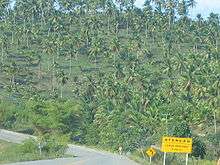BA-099
| BA-099 | |
|---|---|
|
| |
| Route information | |
| Length: | 356 km (221 mi) |
| Major junctions | |
| From: | Salvador International Airport, in Salvador |
| To: | Aracaju - next to Sergipe state border |
| Location | |
| Major cities: | Salvador, Lauro de Freitas (Bahia), Aracaju (Sergipe) |
| Highway system | |
|
Highways in Brazil | |
The Rodovia Estrada do Coco and Linha Verde, (BA-099), is a state highway which runs through the northeastern part of the state of Bahia and southeastern region of the state of Sergipe in Brazil. The road connects the city of Salvador, the capital of Bahia, to the city of Aracaju, the capital of Sergipe.
Major tourist cities of North Littoral that are connected by BA-099 are Salvador, Lauro de Freitas, Arembepe, Praia do Forte, Imbassaí (Linha do Côco or Coconut Line) and Imbassaí, Porto do Sauípe, Massarandupió, Subaúma, Sítio do Conde, Costa Azul, Mangue Seco (Linha Verde or Green Line).
History
The highway is managed and maintained by a state concession to the private company CLN (Concessionária Litoral Norte) since 2001,[1] and therefore is a toll road. From that transfer of ownership up to today it has largely improved in road quality and safety.
Transport

By Car
From the city of Salvador to the North Coast direction, one can get along Itapuã or via Paralela, both of them to the Airport direction.
By Bus
The bus company serving the road is called Linha Verde.
From Salvador
The bus company Linha Verde offers a varied timetable, up to 5am to 6pm, near the ferry boat pier, which comes from Itaparica island, there are many stops along the way, near G. Barbosa supermarket, near the Iguatemi Shopping Center, Extra Paralela supermarket and by the BA-099 (Coconut) Highway North.
From the Bus Station
The bus station charge R$ 1,00 as tax fee. It is long 1 hour and forty minutes with four daily schedule: 09:45am, 1:30pm, 4:30pm and 6:30pm
From International Airport
Buses from the bus station pass by the airport every 20 minutes later the over schedule. The bus stop is in front of the arrival, next to the "Bahianas de Acarajé."